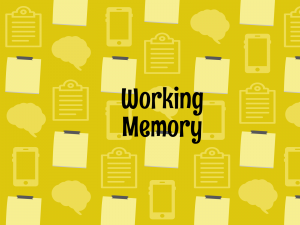Note: This is one of a 10 blog series on learning traits. Read about all 10 learning traits here.
Working memory is the skill that drives how easily and efficiently you can work through multi-step problems. When we describe someone as a “quick thinker” they probably have strong working memory. Not surprisingly, it is key to academic success.
What is Working Memory?
Working memory is how easily you can juggle multiple bits of information in your head and use that information to do something. Remembering a multi-digit phone number and then dialing it is an example. So is solving a multi-step math problem, particularly if it requires mental math. Reading comprehension relies heavily on working memory–you need to remember what you just read to draw those connections.
Why is Working Memory So Important?
Beyond second grade, most of what we ask students do requires following multi-step directions. If they can’t remember what they do from what step to the next, it can be hard to successfully complete a task from start to finish.
What are the signs of challenges?
Signs of a student struggling could include disorganization, poor note taking, difficulty following directions, forgetting what they just read or heard or difficulties with mental math. Yes, working memory affects a lot of what students need to do.
What to do if I think my student is struggling?
If you suspect your child is struggling with working memory you should discuss your concerns with a school counselor or your pediatrician. Since difficulties with verbal reasoning or verbal memory could look like working memory difficulties, make sure they use an objective test, not just observation. If you are uncomfortable talking to someone but have concerns, try a working memory test at home and then make a decision if you need to speak with a professional.
How can I support Working Memory?
If you’d like to help them be more organized and efficient, there are plenty of strategies. Using checklists can help with all sorts of tasks from correcting homework to remembering chores. Putting those phones away is essential — students should not be multi-tasking! Most students benefit when they are taught specifically how to check work in different subjects and circumstances.
Check out our working memory test!

